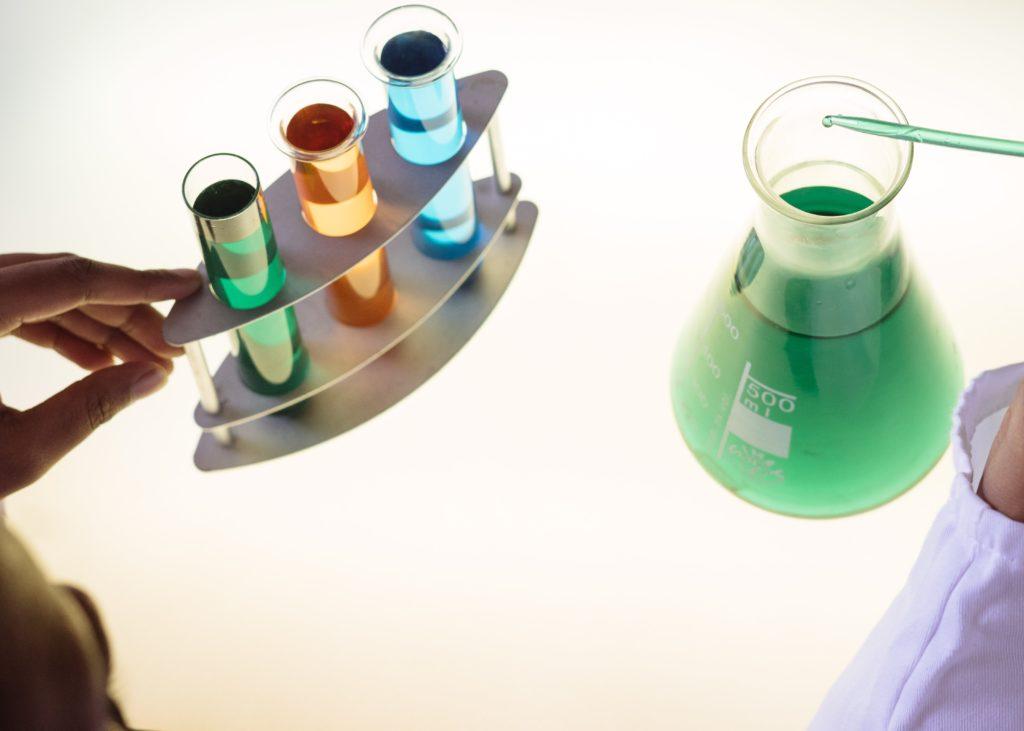Chemistry Extended Essay (EE) topics are topics that are specific to the study of chemical reactions, properties and structures of matter. These can include topics such as the effectiveness of different catalysts in chemical reactions, the properties of a new synthetic material, the environmental impact of a particular chemical process, or the impact of a chemical substance on human health. The key is that the topic must be related to the study of chemistry.

There are some interesting topics for the Chemistry Extended essay:
- Investigating the properties of a new synthetic material
- The effect of acid rain on plant growth
- The result of different catalysts on the rate of a chemical reaction
- The efficiency of different methods of water purification
- Investigating the properties of a new drug
- The effect of pollution on the pH of a local waterway
- The impact of temperature on the rate of a chemical reaction
- The effect of light on photosynthesis in plants
- The result of different fertilizers on plant growth
- Investigating the properties of a new type of battery
- The effect of different metals on the corrosion rate of steel
- The effect of different sugars on fermentation
- The effect of pollution on the health of aquatic organisms
- The effect of different temperatures on the solubility of a salt
- Investigating the properties of a new type of solar cell
- The development of pH on the rate of a chemical reaction
- The effect of different surfactants on surface tension
- The impact of different kinds of catalysts on the yield of a chemical reaction
- The effect of different types of food preservatives on the growth of bacteria
- Investigating the properties of a new type of superconductor
Please keep in mind that if you opt for Chemistry as your IB extended essay subject, the above topics are suggestions and should be refined to make them researchable, specific, and clear as per the requirement of the Extended Essay.
When applying these Chemistry Extended Essay topics, students can use the following methods:
- Investigating the properties of a new synthetic material: Students can conduct experiments to test the properties of the new synthetic material, such as its strength, durability, and resistance to heat and chemicals. They can also conduct a literature review to gather information about the current research on the topic and identify any gaps in the research that their study can fill.
- The result of acid rain on plant growth: Students can conduct experiments to test the effect of acid rain on plant growth by exposing plants to different levels of acidity and measuring their growth and health. They can also conduct a literature review to gather information about the current research on the topic and identify any gaps in the research that their study can fill.
- The impact of different catalysts on the rate of a chemical reaction: Students can conduct experiments to test the effect of different catalysts on the rate of a chemical reaction by measuring the rate of the reaction with different catalysts and comparing the results.
- The efficiency of different methods of water purification: Students can conduct experiments to test the efficiency of different methods of water purification by measuring the amount of impurities present in the water before and after treatment.
- Investigating the properties of a new drug: Students can conduct experiments to test the properties of the new drug, such as its effectiveness, side effects, and potential interactions with other drugs. They can also conduct a literature review to gather information about the current research on the topic and identify any gaps in the research that their study can fill.
- The effect of pollution on the pH of a local waterway: Students can conduct experiments to measure the pH of a local waterway and compare it to the pH of a clean waterway. They can also conduct a literature review to gather information about the current research on the topic and identify any gaps in the research that their study can fill.
- The result of temperature on the rate of a chemical reaction: Students can conduct experiments to test the effect of temperature on the rate of a chemical reaction by measuring the rate of the reaction at different temperatures and comparing the results.
- The effect of light on photosynthesis in plants: Students can conduct experiments to test the effect of light on photosynthesis in plants by exposing plants to different levels of light and measuring their photosynthetic activity.
- The effect of different fertilizers on plant growth: Students can conduct experiments to test the effect of different fertilizers on plant growth by exposing plants to different types of fertilizers and measuring their growth and health.
- Investigating the properties of a new type of battery: Students can conduct experiments to test the properties of a new type of battery, such as its capacity, charge time, and discharge rate. They can also conduct a literature review to gather information about the current research on the topic and identify any gaps in the research that their study can fill.
- The effect of different metals on the corrosion rate of steel: Students can conduct experiments to test the effect of different metals on the corrosion rate of steel by exposing steel samples to different metals and measuring their corrosion rate.
- The effect of different sugars on fermentation: Students can conduct experiments to test the effect of different sugars on fermentation by measuring the rate of fermentation with different sugars.
- The effect of pollution on the health of aquatic organisms: Students can conduct experiments to test the effect of pollution on the health of aquatic organisms by measuring the health of aquatic organisms in polluted and non-polluted areas.
- The effect of different temperature on the solubility of a salt: Students can conduct experiments to test the effect of different temperatures on the solubility of a salt by measuring the solubility of a salt at different temperatures and comparing the results.
- Investigating the properties of a new type of solar cell: Students can conduct experiments to test the properties of a new type of solar cell, such as its efficiency, power output, and resistance to heat and weather. They can also conduct a literature review to gather information about the current research on the topic and identify any gaps in the research that their study can fill.
- The effect of pH on the rate of a chemical reaction: Students can conduct experiments to test the effect of pH on the rate of a chemical reaction by measuring the rate of the reaction at different pH levels and comparing the results.
- The effect of different surfactants on surface tension: Students can conduct experiments to test the effect of different surfactants on surface tension by measuring the surface tension of a liquid with and without surfactants and comparing the results.
- The effect of different types of catalysts on the yield of a chemical reaction: Students can conduct experiments to test the effect of different types of catalysts on the yield of a chemical reaction by measuring the yield of the reaction with different catalysts and comparing the results.
- The effect of different types of food preservatives on the growth of bacteria: Students can conduct experiments to test the effect of different types of food preservatives on the growth of bacteria by measuring the growth of bacteria in the presence of different food preservatives and comparing the results.
- Investigating the properties of a new type of superconductor: Students can conduct experiments to test the properties of a new type of superconductor, such as its conductivity, resistance to heat, and potential applications. They can also conduct a literature review to gather information about the current research on the topic and identify any gaps in the research that their study can fill.
It’s important to note that the above examples are suggestions for how to apply these Chemistry EE topics, and that students can also come up with their own methods as long as they are appropriate, ethical, and follow the guidelines of the Extended Essay.

Need help with your IB Chemistry EE?
From research and analysis to structuring and editing, our skilled mentors will be by your side, helping you craft an exceptional extended essay that not only meets the stringent IB criteria but also reflects your passion for Chemistry studies.
While writing an Extended Essay can be a challenging task, it’s also an opportunity for students to showcase their research and writing skills while exploring a topic that interests them. However, if you’re feeling overwhelmed and need a little help, don’t hesitate to reach out to writing services for support.
They can assist with research, editing, proofreading, and formatting to help you create an essay that will knock the socks off your IB examiner. Think of it as a fun adventure, where you get to explore a topic you’re passionate about and with the right guidance, you’ll be able to write an essay that you’ll be proud of!
Luke MacQuoid
Luke MacQuoid has extensive experience teaching English as a foreign language in Japan, having worked with students of all ages for over 12 years. Currently, he is teaching at the tertiary level. Luke holds a BA from the University of Sussex and an MA in TESOL from Lancaster University, both located in England. As well to his work as an IB Examiner and Master Tutor, Luke also enjoys sharing his experiences and insights with others through writing articles for various websites, including extendedessaywriters.com blog
- The Role of Technology in Shaping Modern Knowledge


 by Luke MacQuoid
by Luke MacQuoid - Interlinking TOK with Other IB Subjects


 by Luke MacQuoid
by Luke MacQuoid - How Many Sources Needed for TOK Essay?


 by Luke MacQuoid
by Luke MacQuoid - How Much Does a TOK Essay Cost?


 by Luke MacQuoid
by Luke MacQuoid - IB TOK Presentation Examples for Students


 by Luke MacQuoid
by Luke MacQuoid - 25 Topics for TOK Presentation. Ideas for IB Students


 by Luke MacQuoid
by Luke MacQuoid